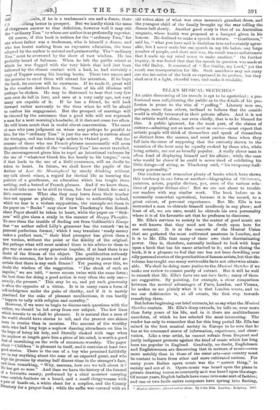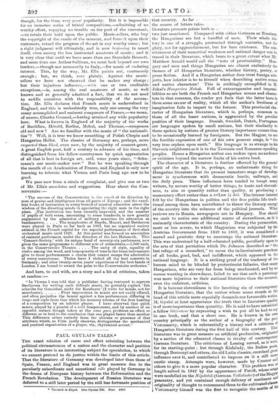ELLA'S MUSICAL SKETCHES.*
Ax artist discoursing of his travels is apt to be egotistical ; a professional man enlightening the public as to the details of his profession is prone to the vice of "puffing." Literary men are, perhaps, more than others, inclined to believe that the outside world is vitally interested in their private affairs. And it is not the artistic world alone, nor even chiefly, that is to be blamed for this. A public ignorant, for the most part, of the claims of culture—admiring not so much merit as success—must expect that artistic people will think of themselves and speak of themselves as distinct from the masses, and must pardon them when they fall into the error of supposing that the curiosity shown to the sensation of the hour may be equally evoked by those who, while being artistic, are not so broadly popular. A really clever man is often fond of displaying himself and his affairs ; while the man who would be clever if he could is never tired of exhibiting his little doings—of airing, as Thackeray said, "his twopenny-halfpenny personality."
Our readers must remember plenty of books which have shown
this tendency in one form or another—biographies of litCrateurs, painters, actors, popular divines, yes, even of the various relatives of popular divines also ! But we are not about to trouble our readers with any similar work. The book before us is necessarily somewhat egotistical, because it is the record, to a great extent, of personal experiences. But Mr. Ella is too instructed a man to obtrude himself needlessly in any place ; and least of all, we are sure, would he obtrude his own personality where it is of his favourite art that he professes to discourse.
Mr. Ella's services to society in the matter of good music are so well known that they need not be dwelt upon here for one moment. It is at the concerts of the Musical Union that are gathered the most cultivated amateurs in London, and it is to Mr. Ella that many of these owe their discriminating power. One is, therefore, naturally inclined to look with hope upon a book that has his name attached to it ; and on closing the book, it is a pleasure to feel that one has not been dawdling over silly personal stories of the peculiarities of famous artists, but that the volume has taught one many serviceable facts not otherwise attainable. We shall be doing more justice to the Musical Sketches if we make our review to consist partly of extract. But it will be well to remark that Mr. Ella's facts are not bare facts; many of them are suggestive. By pointing, for example, a clear comparison between the musical advantages of Paris, London, and Vienna, he makes us see plainly what it is that London wants, and to see our deficiencies is, at all events, the first step towards remedying them.
But before beginning our brief extracts, let us say what the Musical Sketches contain. Mr. Ella's diary extends, he tells us, over more than forty years of his life, and in it there are multitudinous anecdotes, of which he has selected the most interesting. The reader has only to remember that for this long period Mr. Ella has mixed in the best musical society in Europe to be sure that he has at his command stores of information, experience, and observation. Like a true artist, he cannot refrain from frequent and justly indignant protests against the kind of music which has long been too popular in England. Gradually, no doubt, Englishmen and Englishwomen are discovering that in matters of music—even more notably than in those of the sister arts—our country must be content to learn from other and more cultivated nations. For many years Italian opera music was the "correct thing," in society and out of it. Opera-music was heard upon the piano in private drawing rooms as constantly as it was heard upon the stage. Of recent years, English ballads have come into some sort of fashion; and one or two facile native composers have sprung into fleeting, though, for the time, very great popularity. But it is impossible for an immense series of trivial compositions,—admitting of no
worthy effort, repaying no trouble on the part of the executant, —to retain their hold upon the public. Music-sellers, who buy the copyright of the music of the moment, and force it upon their customers, retard the progress of the art in any worthy sense ; but
a right judgment will ultimately, and is now beginning to assert itself, even among the less instructed amateurs of music ; and it
is very clear that until we have more than one Sterndale Bennett, and more than one Arthur Sullivan, we must look beyond our own borders,—though not necessarily to Italy,—for music of enduring interest. This, by the way, Mr. Ella points out, courteously enough ; but, we think, very plainly. Against the musicsellers we have not observed that lie makes any charge ; but their injurious influence,—with one or two creditable exceptions,—is, among the real amateurs of music, so well known and so generally admitted a fact, that we do not need to saddle ourselves with the responsibility of the accusa tion. Mr. Ella declares that French music is undervalued in England, and this is undoubtedly true, only one among the very many accomplished and eminent composers of France,—we mean, of course, Charles Gounod,—having attained any wide popularity here. What is known in England of the majority of the works of Boeildieu, H6rold, Berlioz, Mehul, and Thomas,—composers old and new ? Are we familiar with the music of "the nationalities"? Well, it is true we know something of Polish Chopin and Hungarian Heller. The classics of Germany are, perhaps, more
respected than liked, even now, by the majority of concert-goers. A great English poet, half a century in advance of his time, and
distinguished from his fellow-countrymen by quick appreciation of all that is best in foreign art, said, some years since, " Schumann's our music-maker now." But he was speaking through the mouth of an Academician of France, and England is only now learning to tolerate what Vienna and Paris long ago saw to be good.
We pass now from a strain of complaint, and give one or two of Mr. Ella's anecdotes and suggestions. Hear about the Conservatoire :—
" The success of the Conservatoire is the result of its direction by men of genius and intelligence from all parts of Europe ; and the excellent books of instruction in every branch of musical education attest the wisdom of the directing minds in appointing the right men to the right place. ;The institution has been recently improved, and the number of pupils of both sexes, amounting to some hundreds, is now greatly augmented by the admission of military muscians for education as bandmasters The symphonies of Haydn, Mozart, and Beethoven were played in Paris so far back as 1805, but no organized society existed in the French capital for the especial performance of first-class orchestral music until 1828. At this period was formed an association of eminent performers, under the direction of the late Habeneck. This 'Concert-Society,' with its unique band of seventy-six performers, now gives the same programme to different sets of subscribers,-1,500 each, in the Conservatoire Theatre The unity of style, equality of timbre among the wood, and homogeneity of tone in the brass instruments give to these performances a charm that cannot escape the admiration of every connoisseur. Thrice have I visited all the best concerts in Germany; and after twenty-seven years' experience of the best bands of London. I am bound to award the palm to the Conservatoire orchestra."
And here, to end with, are a story and a bit of criticism, taken at random :—
"In Vienna I was told that a publisher having ventured to reprove Beethoven for writing such difficult music, he pettishly replied, 'Ich schreibe für Gemiither, nicht fiir Kaufleute ' (I write for minds, not for merchants) First impressions in music are not easily effaced, and often prejudice the hearer against a fine performance, differing in tempo and style from that which his memory retains of the first hearing of a composition by an inferior player. I have observed that quick music, played by a pianist of a cold temperament, and by another of an opposite nature, though taken at the same pace, produces an effect so different as to lead to the conclusion that one played faster than another This difference arises entirely from the absence or presence of that attribute which, as Fdtis justly observes, distinguishes the mechanical and poetical organization of a player, viz., rhythmical accent."



































 Previous page
Previous page